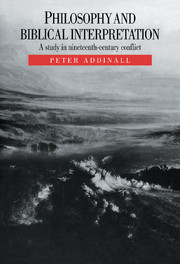Book contents
- Frontmatter
- Contents
- Preface
- Introduction
- 1 The general picture
- 2 David Hume
- 3 William Paley
- 4 Biblical conservatism
- 5 Conservative natural theology: Paley's design argument
- 6 Conservative natural theology: Thomas Chalmers
- 7 Liberal natural theology
- 8 The later nineteenth century
- 9 Immanuel Kant
- 10 Critical philosophy and the Bible
- Conclusion
- Notes
- Bibliography
- Index
- Frontmatter
- Contents
- Preface
- Introduction
- 1 The general picture
- 2 David Hume
- 3 William Paley
- 4 Biblical conservatism
- 5 Conservative natural theology: Paley's design argument
- 6 Conservative natural theology: Thomas Chalmers
- 7 Liberal natural theology
- 8 The later nineteenth century
- 9 Immanuel Kant
- 10 Critical philosophy and the Bible
- Conclusion
- Notes
- Bibliography
- Index
Summary
It has been maintained that in the nineteenth century ‘The main philosophical influence was that of Immanuel Kant’; that Kantianism was the guiding principle in the religious thought of the century, mediated by Schleiermacher and Ritschl; and that Kant's many-sidedness ‘was to make of him … a power from which the mind of the ensuing century seemed to have little wish to free itself. As far as British religious thought was concerned it would appear that nothing could be further from the truth; and if it had really been the case, there would be some difficulty accounting for the dominating influence of Paley and the general confusion which marked the latter part of the century. There is no denying that the name of Kant was well known and that some acquaintance with his philosophy was not uncommon, and there is also no denying that thinkers were entitled to take from Kant's teaching what they regarded as valuable and reject what they regarded as false; but to speak of a dominating influence implies general understanding and acceptance of the critical philosophy, and there is little evidence of either.
In his substantial study of Essays and Reviews, Ieuan Ellis has referred to the influence of German thought on the essayists, an influence which went far beyond that of Baron Bunsen and which was to be seen at times more clearly in their other works. Kant is one of those singled out for particular mention; but the Germanic influence was also subject to significant qualification.
- Type
- Chapter
- Information
- Philosophy and Biblical InterpretationA Study in Nineteenth-Century Conflict, pp. 217 - 261Publisher: Cambridge University PressPrint publication year: 1991



